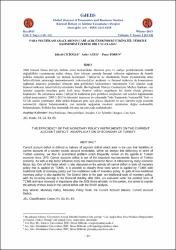PARA POLİTİKASI ARAÇLARININ CARİ AÇIK ÜZERİNDEKİ ETKİNLİĞİ: TÜRKİYE EKONOMİSİ ÜZERİNE BİR UYGULAMA

Göster/
Erişim
info:eu-repo/semantics/openAccessTarih
2013Erişim
info:eu-repo/semantics/openAccessÜst veri
Tüm öğe kaydını gösterÖzet
Current account deficit is defined as balance of payment deficit which arise in the case that liabilities in current accounts of a country exceed account receivables. When we analyse this deficiency in terms of Turkish economy, we face to economical problem which frequently remain on the agenda in Turkish economy since 1970. Current accounts deficit is one of the important macroeconomic factors of Turkish economy. As well as this factor influence many real macroeconomic factor, it influenced by many economic factor, too. One of the factor which is also discussed on the activity of current deficit is tools of monetary policy that is applied by TCMB. It is possible to classify these tools which is applied by TCMB with traditional tools of monetary policy and non-traditional tools of monetary policy. In spite of non-traditional monetary policy is also applied by The Central Bank in the past, non-traditional tools of monetary policy, with the incresing damage to the financial stability after 2001, are evaluated under the political tools of TCMB and have increased in importance after the 2008 financial crisis. In this context, it is aimed to explain the activity of these tools on the current deficit with the SVAR analysis.

















